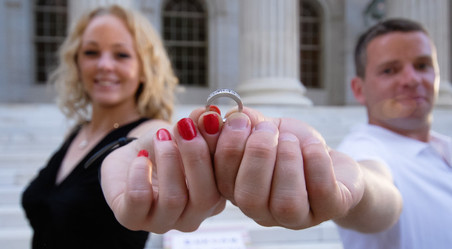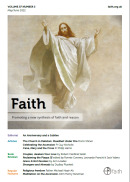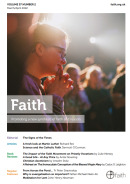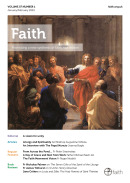Featured
Marriage, the Church, and the need for courage
Editorial:
01.03.19
Marriage is the lifelong union of a man and a woman, establishing a new family. It is, by its very nature, designed for the procreation and raising of children. It is sacred, designed by God from the beginning and establishing in human form the sacred bond between Christ and his Bride the Church.
That is what we have a right and duty to teach in Catholic schools, youth groups and from the pulpit of every Catholic church. It is not an optional pious statement nor is it something that is subject to Government policy.
Keeping The Seal
Article:
01.03.19
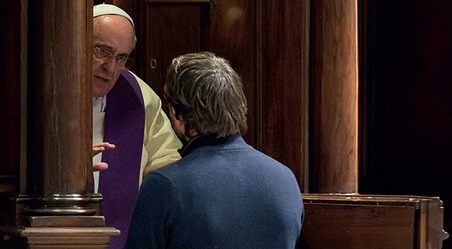
Keeping The Seal
Australia has been presented with plans to force priests to break the seal of confession. Fr John Michael McDermott SJ explains why the seal must never be broken.
Interview: Sisters in blue, and with work to do
Article:
01.03.19
Interview: Sisters in blue, and with work to do
Joanna Bogle meets the Community of Our Lady of Walsingham
It sounded rather attractively medieval – a community of religious sisters spending an afternoon working on embroidery. But this was a definitely 21st-century scene. The young sisters at the Community of Our Lady of Walsingham belong to a generation that has not been brought up to do cross-stitch. They are more at home with computers and mobile phones than with making church kneelers. So they had invited an older lady to come and teach them the basics – and the result, it is planned, will be hand-stitched blue-and-white kneelers for their new chapel, set beneath the rafters of their new convent in a converted barn in Dereham, Norfolk.
The Catholic Church and Marriage
Article:
01.03.19
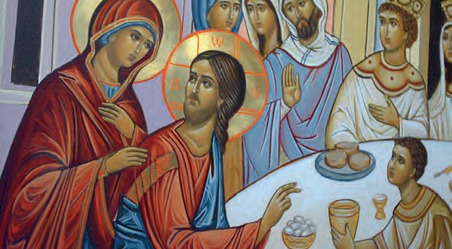
The Catholic Church and Marriage
Cara Treacy
In the 2018 Catholic Young Writer Award, sponsored by the Catholic Union Charitable Trust, pupils at Catholic secondary schools in Britain were invited to write a letter to a friend who had asked about the Catholic Church’s teaching on marriage, and what happens at a Catholic marriage ceremony. They were asked to make reference to the Scriptures and to the Catechism of the Catholic Church. The winning entry, gaining the coveted Young Writer trophy and a selection of books, was Cara Treacy of Sacred Heart of Mary School, Upminster, Essex. We publish the main part of her essay here. We do not pretend that this essay offers profound theological insights, but it shows that a young Catholic can grasp the essentials of the Church’s teaching in this area and write on the subject with enthusiasm.
Holloway on… Sacramentum Mundi: The Evidence for Jesus
Article:
01.03.19
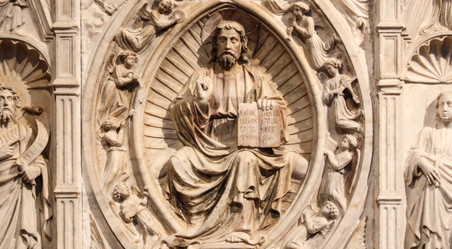
Holloway on…
Sacramentum Mundi:
The Evidence for Jesus
Part I
In this Editorial in FAITH of May/June 1985 Fr.Holloway reflected on a recent TV programme, “The Evidence for Jesus”, which took a sceptical approach to the reliability of the New Testament.
The modern man or woman looks at the “Evidence for Jesus”, especially the factual evidence of the Bible, Old Testament and New, and murmurs “It was all an awful long time ago. Nobody can be really sure what happened”. Is it fair to say that 2,000 years of time and cultural upheaval, must dim the credibility of evidence that is so far back in time? It surely must — so vast a lapse of time lessens the credibility of faith based upon such an historical record. The modern mind says, the ordinary man in the club says, “People were simple in those days, they knew nothing about what we know of the world and the universe. They could not even tell the difference for sure between illness and being possessed by the Devil. Anything that happened which they could not understand, they thought had been done by God directly.” In fact the evidence for Jesus has to be much more than that. It has to be faith from the evidence for the activity of God in human history.
Book Review: The Presence of the One who loves us eternally
Article:
01.03.19
The Presence of the One who loves us eternally
The Power of Silence – Against the Dictatorship of Noise by Robert Cardinal Sarah with Nicolas Diat, Ignatius, 244pp, £16.50.
reviewed by Sr Claire Waddelove OSB
Book Review: Thanks to Paul, we have inherited the Church
Article:
01.03.19
Thanks to Paul, we have inherited the Church
Paul: A Biography by N. T. Wright, HarperOne, 464pp, UK £12.99 (paperback), US $20.39 (hardback).
reviewed by Sister Mary Dominic Pitts
Book Review: A flawed apologetic
Article:
01.03.19
A flawed apologetic
The Landscape of Faith : An Explorer’s Guide to the Christian Creeds by Alister McGrath, SPCK, 276pp, £9.94.
reviewed by Stephen Boyle
Book Review: Life is always meaningful
Article:
01.03.19
Life is always meaningful
Matters of Life and Death – A Catholic Guide to the Moral Questions of Our Time by Gerard M. Verschuuren, Angelico Press, 201pp, paperback £12.50.
reviewed by Lucy Courlet de Vregille
-
Marriage, the Church, and the need for courage
Marriage is the lifelong union of a man and a woman, establishing a new family. It is, by its very nature, designed for the procreation and raising of children. It is sacred, designed by God from the beginning and establishing in human form the sacred bond between Christ and his Bride the Church.That is what we have a right and duty to teach in Catholic schools, youth groups and from the pulpit of every Catholic church. It is not an optional pious statement nor is it something that is subject to Government policy.Identity PoliticsWe are all well aware of the now drearily established notion of “identity politics” . Following the 1960s sexual revolution in the West, and the subsequent entrenchment into law of policies designed to remove legal protection for sexual integrity and the rights of unborn babies, a miserable mixture of tribal groupings has been created, vying for attention. We have the “gay rights” lobby vying with the “trans” lobby, and new and militant forms of “animal rights” to add to a mix already made confusing.We have stopped smiling at wry references to the fact that, with the establishment of legal arrangements for same-sex “marriage,” there is no reason why such arrangements should not extend to threesomes, or unions involving all sorts of sexual partners on various levels of semi-permanence. We know only too well that money taken from us in taxes pays for the distribution of contraceptive drugs and devices to children and forms of instruction that urge them to consider themselves sexually available from puberty onwards.The Christian Way
What can we do as Catholics to ensure that the truth about marriage is taught and its meaning understood? How can we nurture and sustain Catholic marriages? Decades ago Father Edward Holloway noted that living the Christian way in modern British society was like trying to remain clean and healthy while living amid open sewers. Things are much messier today: the sewage has seeped into the land and infection is widespread…and the very pumps which ought to be controlling it and ensure health and wellbeing are being used to spread it systematically everywhere.None of which allows us to assert smugly that it’s all the fault of other people – including, of course, people in public office, people holding office in the Church, people with power in industry, but certainly not us - and that therefore we should find ourselves some Crusoe-style mental and emotional islands and cope with things from there. On the contrary. Christ calls us not to be afraid, and will ask us , at the end of our lives, for an account of how we lived and the measure by which we sought to help others especially the poor and miserable.EffectiveThe FAITH Movement offers a powerful and effective way forward. For something approaching half a century, it has fostered the vocations of good numbers of young men to the priesthood. It has offered formation and spiritual nourishment to young people whose children and grandchildren now arrive with noisy enthusiasm at the FAITH Summer sessions. And constantly growing and evolving networks of friendship and contacts ensure that new groups form, whether formally as with meetings in London and Glasgow and elsewhere, or informally through social get-togethers. In this, it shares characteristics with other New Movements in the Church, a significant development first formally given recognition by Pope St John Paul and now a part of Catholic life worldwide that offers real hope for the Church of the 21st century.DifficultBut it’s going to be difficult to teach and even to live the truth of Christian marriage and family life in the immediate future. The emergence of “identity politics” has created powerful tribes, fuelled by the bitterness and confusion of their origins. This summer there will be marches through Britain’s cities under the slogan of Pride. Our country’s flag will be replaced, on Government offices in Whitehall, with the striped Pride flag announcing proud support for homosexual and lesbian activity. There will be pressure on churches to follow suit – and it is, alas, very likely that some Anglican churches or cathedrals will oblige. The police and the Armed Forces will, as last year, be formally involved, with posters announcing full support for Pride and with pressure on representatives of the Forces to take part in the marches. There will be formal statements of warm support from public officials at national and local level.Pride is one of the seven deadly sins, and always brings misery and failure. Even without the link now established between this word and the homosexual lifestyle, there is something bleak and miserable about the idea of a nation celebrating Pride. As the saying goes, Pride comes before a fall.Rescuing the woundedThe Church has recently been described as being like a fieldhospital, ready to rescue the wounded. There are going to be many victims of Pride over the next years, and the answer to their wounds – and to the collective wound of the society attempting to celebrate Pride and falling so miserably as it does so – is Christian love. Not sentimentality, or bogus assertions of kindness that carry no meaning. Not affirmations that there are no wounds. Rather, that authentic Christian love that modern saints have been raised up to teach us: Maximillian Kolbe in Auschwitz, Mother Theresa in the slums of Calcutta, John Paul II in hospital forgiving the would-be assassin who had ripped his stomach apart.We will teach the truth about God, marriage, and family life, not with pride but with love – and love is actually stronger and more enduring than pride. And love and courage go together: Christ on the Cross, martyrs down the centuries.Teaching the truthAnd this teaching of the truth cannot be confined to private gatherings. Britain’s Catholic schools are extremely popular and are often over-subscribed. Parents like the sense of community, the uniforms, the generally good academic results. Government policies have favoured Church schools over recent decades. But public funding, popularity, and official support bring the risk of an obligation to support the official line on, for example, samesex marriage or “transgender” ideology. We cannot do that: Catholic schools must teach the truth about marriage, about the human person, about God’s plan for the human race and his creation of us as male and female.A bigger danger is from within: a lack of teachers who know, live and can teach the Catholic Faith, and a lack of parents willing to stand firm and back the school when the Faith is taught. Where campaigning parents announce that they want a school to be“supportive of gay and transgender pupils”, or where teachers and governors sense that they may fail to be supported by Bishops when seeking to uphold the Church’s teaching, trouble beckons.CourageThe Church, in parishes, schools and Catholic groups and organisations, must teach the truth and the Bishops must take the lead in showing how that is to be done. We need to be reminded of the need for courage – and shown this by word and example. We need to speak up about the right and duty of the Church in a free society to uphold and teach the Christian Gospel in all its fullness. And we need to know that all of this is going to be difficult and challenging and that we need to encourage one another and our friends and allies in non-Catholic churches and of other faiths who share our concern for human dignity and for the truth of marriage and family life.As a start, when the subject of marriage comes up in discussions with officialdom, Catholics could use the wording of the first paragraph of this Editorial, and explain that this is a non-negotiable central reality in Catholic teaching and that whatever the government of the United Kingdom states, we cannot and will not change this. We have been here before: we are the monarch’s good servants, but God’s first.

